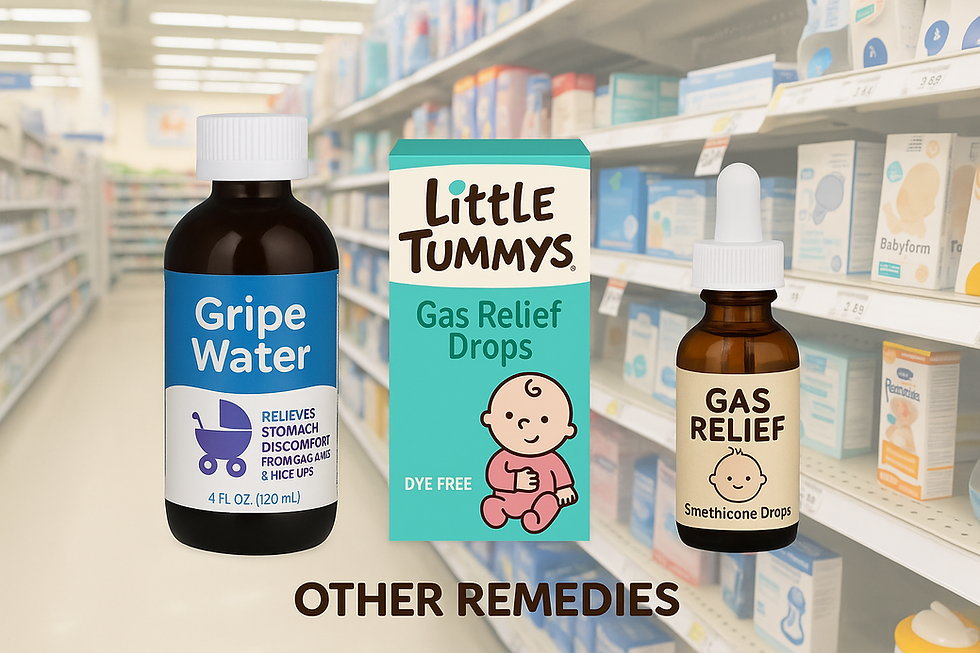Top 3 Nutrients for a Healthy Mom & Baby
- Colleen Mckay
- Mar 17
- 3 min read

Breastfeeding is one of the best things you can do for your baby’s health, but it also increases your body's nutritional demands. Eating a well-balanced diet ensures that both you and your baby receive the necessary nutrients for optimal growth and development. Below, we’ll discuss the top three most important nutrients for breastfeeding mothers and how to get them through food.
1. DHA (Docosahexaenoic Acid) – Essential for Brain Development
DHA is a type of omega-3 fatty acid critical for your baby’s brain and eye development. Since babies rely on breast milk for this nutrient, it’s important for mothers to consume enough DHA-rich foods.
Best Food Sources of DHA:
Fatty fish (salmon, sardines, mackerel) – Aim for two servings per week to meet DHA needs.
Chia seeds & flaxseeds – These provide ALA (alpha-linolenic acid), which the body can convert into DHA in small amounts.
Eggs enriched with omega-3s – A convenient way to boost DHA intake.
🔎 Evidence: Research suggests that higher maternal DHA intake is linked to improved cognitive and visual development in infants (Koletzko et al., 2020, Journal of Perinatal Medicine).
2. Iron – Prevents Fatigue and Supports Baby’s Growth
Iron is crucial for maintaining your energy levels and preventing anemia, which is common postpartum. It also supports your baby’s red blood cell production.
Best Food Sources of Iron:
Lean meats (beef, chicken, turkey) – Provide heme iron, which is highly absorbable.
Lentils & beans – Plant-based sources of iron; pair them with vitamin C-rich foods (like citrus fruits) to enhance absorption.
Spinach & kale – Also great sources of folate, another key nutrient for breastfeeding moms.
🔎 Evidence: The CDC recommends a daily intake of 9 mg of iron for breastfeeding mothers, as iron stores from pregnancy gradually decline postpartum (Centers for Disease Control and Prevention, 2021).
3. Calcium – Maintains Bone Strength
Your baby gets calcium from your breast milk, and if your diet doesn’t provide enough, your body will pull calcium from your bones. This can lead to bone density loss over time, making calcium intake essential.
Best Food Sources of Calcium:
Dairy products (milk, yogurt, cheese) – Contain both calcium and vitamin D, which helps calcium absorption.
Leafy greens (collard greens, bok choy) – A great plant-based source of calcium.
Almonds & sesame seeds – Provide calcium as well as healthy fats.
🔎 Evidence: Studies show that lactation can cause temporary bone loss, but adequate calcium intake helps prevent long-term deficits (Kalkwarf & Specker, 2021, American Journal of Clinical Nutrition). The National Institutes of Health (NIH) recommends 1,000 mg of calcium daily for breastfeeding mothers.
Additional Tips for a Balanced Breastfeeding Diet:
✅ Stay Hydrated – Drink 8–10 cups of water daily to support milk production.
✅ Eat Enough Calories – Breastfeeding burns about 500 extra calories per day, so don’t restrict food intake.
✅ Limit Caffeine & Alcohol – Small amounts are fine, but excessive intake can pass into breast milk.
Final Thoughts
Focusing on DHA, iron, and calcium will help support both you and your baby during breastfeeding. By incorporating these nutrient-rich foods into your diet, you can optimize your milk supply, energy levels, and overall health.
📚 References:
Koletzko, B., et al. (2020). The roles of long-chain polyunsaturated fatty acids in pregnancy, lactation and infancy: Review of current knowledge and consensus recommendations. Journal of Perinatal Medicine, 48(1), 5-20.
Centers for Disease Control and Prevention. (2021). Iron and breastfeeding. Retrieved from https://www.cdc.gov
Kalkwarf, H. J., & Specker, B. L. (2021). Bone health during pregnancy and lactation. American Journal of Clinical Nutrition, 114(2), 623-633.



Comments